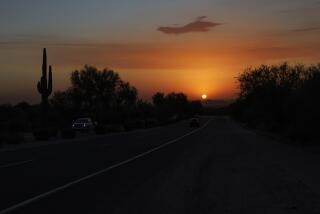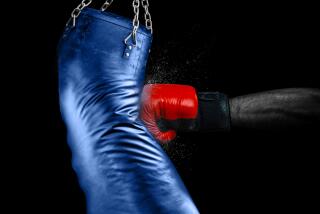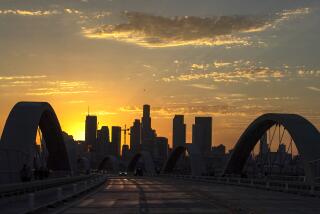Another Kind of Native
- Share via
YORBA LINDA — Sometimes it must be difficult for Americans to accept that Richard Nixon was a native son of California. He was a man who wore a suit to the beach. He was a candidate whose handlers would force him to take 15 minutes of sun each day to develop at least the pretense of a tan. His personal orbit did not intersect with Hollywood people. Being hugged by Sammy Davis Jr. on stage was Nixon’s big moment in the celebrity whirl.
His demeanor, too, hardly seemed to fit the standard perception of California attitude. Richard Nixon was not laid-back. He did not go with the flow. Bitterness could spill from the man. He carried grudges, chewed sour grapes. He brooded. He battled. To those who would ask rhetorically of Nixon, “Would you buy a used car from this man?” the answer should have been: Hell, yes. . . . It happens every hour on car lots across L.A. Had it been his calling, Nixon could have moved a lot of iron. He had the skin for it. He had the hustle.
Nixon never presented himself as a golden son. In his last years, he traded in San Clemente for New Jersey. He did not seem steeped in California lore, did not rhapsodize about this place in the special, lyrical way of many California politicians. He wrote in his memoirs that his 1962 run at the governorship was a reluctant one, a reluctance rooted in a concern that California was too “parochial.”
And yet, he was born right here--”in a house,” his memoirs begin, “my father built.” He was raised here and later in Whittier. He went to school around here, practiced law, met, married and much later buried his wife here. And in a way that many people--maybe even Nixon himself--might miss, he was quintessentially Californian. He simply belonged to a type of Californian that is as overlooked as it is common.
*
Most Californians don’t live by the beach. The beach might have been where their people were headed when they set out long ago, from Oklahoma or Missouri or, as in Nixon’s case, Ohio and Indiana. But they didn’t quite make it. Instead, they settled in the interior, in towns like Bakersfield or Poway or Brea or Yorba Linda. More than California’s coastal communities, these towns tend to differ drastically in their fabric and feel--depending on which immigrant tribe happened to pitch camp there.
In the early 1900s, Nixon’s father had been persuaded that citrus was the new California gold. The flyers that attracted dreamers from all over had described Yorba Linda as a place where “the soil is a deep, rich loam,” with plenty of rainfall and “frostless.” The day Nixon was born the groves were all freezing. The lemon trees his father planted never took in the bad dirt. Oil strikes, which became a sort of fallback aspiration for those who failed in farming, never materialized on the Nixon property.
In a biography, Roger Morris described how Nixon would return sometimes to the failed groves of his father. “The rancher was a liar,” he would tell his old neighbors again and again. They weren’t quite sure what he meant, but his bitterness was easy to read.
The family moved on to Whittier, where Frank Nixon, the father, ran a gas station and grocery store. To young Nixon fell the task of stocking the vegetable bins, a job he was said to have detested. On either side of the Nixon acre sat the large, prosperous ranches of the Leffingwells and Murphys. Streets were named after such grand families. Stories were told about the exploits of their children. Nixon noticed this, and as one of his mentors would later tell a historian, it “had a profound effect. . . .”
*
Again, none of this is exceptional by California standards. For every movie star, there are whole markets of Californians who must pay their $7 to see the show. For every poem about the California promised land, there are millions of prose lives being lived out in the middle somewhere. For every Californian who catches the dream ride, there are so many, many more who miss out. Some become bitter, disappointed. Some become overachievers, hustlers. Some become a bit of both.
As everyone knows, Nixon got busy and went places and reached too far. And now it is more than a little ironic that he will be buried in the same sandy ground that so failed his father. On Saturday, the visitors kept coming to the handsome presidential museum and library that have been built around Frank Nixon’s white bungalow. They had come to sniff history, to tell their Nixon story.
One woman volunteered how Nixon once had autographed a baseball for her. A man described how one time he thought he was passed by Nixon’s limo on the road: “I honked, and I think he waved.” Many visitors were from out of state, and everyone seemed to agree that the Nixon grave was destined to become quite a tourist attraction. In the end, what could be more Californian than that?
More to Read
Sign up for Essential California
The most important California stories and recommendations in your inbox every morning.
You may occasionally receive promotional content from the Los Angeles Times.














